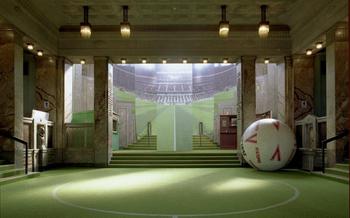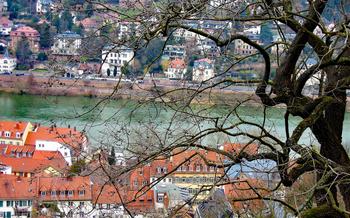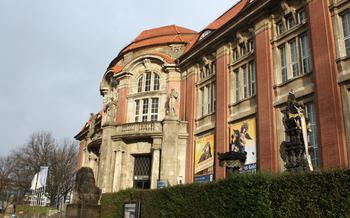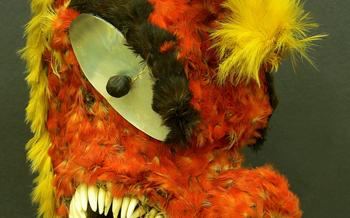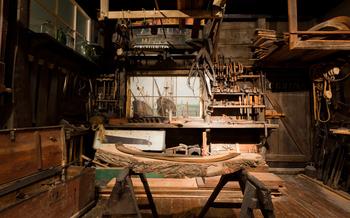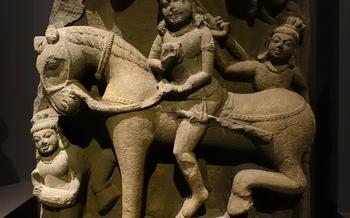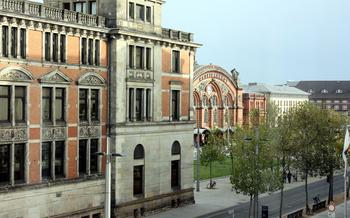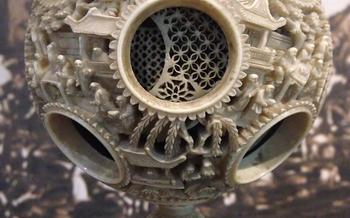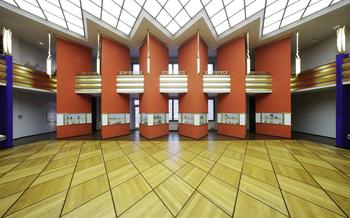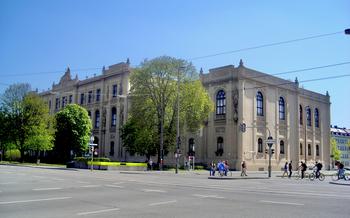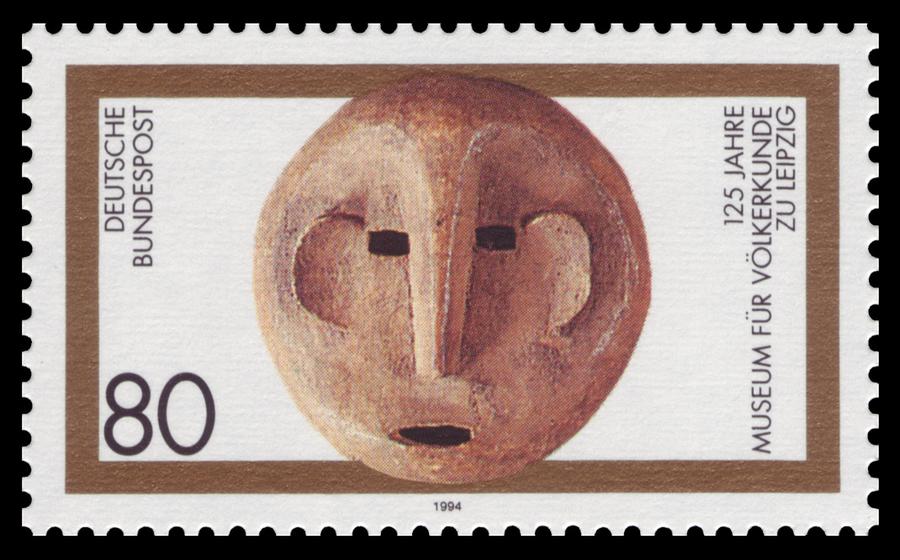
Leipzig Museum of Ethnography
- The Leipzig Museum of Ethnography: Preserving Global Cultural Heritage
- Diverse Collections: A Journey Through Human Cultures
- Permanent Exhibitions: Unveiling Diverse Cultural Narratives
- Temporary Exhibitions: Unveiling Hidden Treasures and Cultural Narratives
- Educational Programs: Fostering Cultural Awareness and Understanding
- Research Facilities: Unveiling the Treasures of Cultural Knowledge
- Cultural Events: A Journey of Intercultural Dialogue
- Interactive Exhibits: Engaging Visitors and Enhancing Learning
- Guided Tours: Unveiling Hidden Treasures and Cultural Insights
- Museum Shop
- Accessibility
- Location and Transportation
- Admission and Hours
- Nearby Attractions
- Insider Tip:
The Leipzig Museum of Ethnography: Preserving Global Cultural Heritage
The Leipzig Museum of Ethnography, founded in 1869, stands as a testament to the rich cultural diversity of the world. Its history is intertwined with Leipzig's emergence as a prominent trade and cultural center in the 19th century. The museum's founding collection originated from donations by merchants, travelers, and missionaries who brought back artifacts from their journeys to distant lands. Over the years, the collection has grown significantly through acquisitions, donations, and fieldwork expeditions, establishing the museum as a leading institution in the field of ethnography.
The Leipzig Museum of Ethnography plays a crucial role in preserving and showcasing cultural heritage from around the world. Its collection encompasses over 200,000 artifacts, including textiles, jewelry, ritual objects, and everyday items, representing the diverse cultures of Africa, Asia, Oceania, and the Americas. The museum's mission is to promote understanding and appreciation of cultural diversity, foster intercultural dialogue, and contribute to the preservation of global cultural heritage for future generations.
The significance of the museum's collection lies in its representation of the richness and complexity of human cultures. The artifacts on display provide a glimpse into the lives, traditions, and beliefs of peoples from all corners of the globe. The museum's collection is not merely a display of exotic objects but a testament to the interconnectedness of humanity and the shared experiences that unite us all.
Diverse Collections: A Journey Through Human Cultures
The Leipzig Museum of Ethnography boasts an extensive and diverse collection that spans the globe, showcasing the rich cultural heritage of various societies. From the intricate feathered headdresses of Papua New Guinea to the vibrant textiles of the Andes, each artifact tells a story of human creativity and expression. Among the highlights of the collection are the elaborate masks from West Africa, which represent spirits and deities and are used in traditional ceremonies. The museum also houses a significant collection of jewelry from around the world, including delicate gold ornaments from India and chunky silver necklaces from Tibet. These diverse collections provide a glimpse into the customs, beliefs, and artistic traditions of different cultures, inviting visitors on a journey through the tapestry of human history.
Permanent Exhibitions: Unveiling Diverse Cultural Narratives
The Leipzig Museum of Ethnography boasts a range of permanent exhibitions, each meticulously curated to showcase the cultural heritage of distinct geographical regions or ethnic groups. Embark on a journey through these captivating displays, where artifacts, textiles, and ritual objects converge to tell the stories of diverse human experiences.
The "Oceania" exhibition immerses visitors in the vibrant cultures of the Pacific Islands. Marvel at the intricate wood carvings from Papua New Guinea, adorned with feathers and shells that symbolize the connection between the land and the sea. Discover the ceremonial masks and costumes of the Maori people, representing their rich mythology and spiritual traditions.
In the "Africa" exhibition, encounter the diverse artistic expressions of the African continent. Explore the intricate bronzes from Benin, renowned for their exceptional craftsmanship and symbolic significance. Admire the vibrant textiles from West Africa, woven with vibrant colors and patterns that reflect the region's rich textile traditions.
Journey to "Asia" and uncover the treasures of ancient civilizations. Gaze upon the serene Buddhist sculptures from Southeast Asia, embodying the region's spiritual beliefs and artistic mastery. Explore the delicate porcelains from China, showcasing the country's long history of ceramic craftsmanship.
The "Americas" exhibition showcases the rich cultural heritage of indigenous peoples from North, Central, and South America. Witness the intricately carved totem poles from the Pacific Northwest, representing the deep connection between humans and the natural world. Admire the colorful textiles from the Andes, woven with motifs that tell stories of community and tradition.
Through these permanent exhibitions, the Leipzig Museum of Ethnography offers visitors a profound understanding of the diversity of human cultures and the interconnectedness of our shared global heritage.
Temporary Exhibitions: Unveiling Hidden Treasures and Cultural Narratives
The Leipzig Museum of Ethnography complements its permanent collection with a dynamic program of temporary exhibitions, delving into specific themes, regions, or cultures. These exhibitions offer a fresh perspective on cultural heritage and provide visitors with an opportunity to explore new facets of human diversity. Past exhibitions have showcased the intricate art of the Incas, the vibrant textiles of the Himalayas, and the captivating masks of West Africa. These exhibitions are curated with meticulous care, presenting a comprehensive narrative that immerses visitors in the cultural context of each artifact. Temporary exhibitions not only enrich the museum's offerings but also foster a sense of curiosity and exploration among visitors, encouraging them to delve deeper into the complexities of cultural heritage.
Educational Programs: Fostering Cultural Awareness and Understanding
The Leipzig Museum of Ethnography recognizes the importance of education in promoting cultural awareness and understanding. To this end, the museum offers a diverse range of educational programs tailored to different audiences, from school groups to senior citizens.
Guided tours led by knowledgeable museum educators provide visitors with in-depth insights into the museum's collections and exhibitions. These tours can be customized to specific interests and needs, ensuring that each group has a personalized and engaging experience.
Interactive workshops allow participants to get hands-on with cultural artifacts, learn traditional crafts, and explore different cultures through immersive activities. These workshops are particularly popular with school groups, as they offer a fun and interactive way to learn about global ethnography.
The museum also hosts lectures, seminars, and symposia on various topics related to anthropology, ethnography, and cultural studies. These events bring together scholars, researchers, and the general public to discuss and exchange ideas, fostering a vibrant intellectual community.
Additionally, the museum offers educational resources for teachers, including lesson plans, worksheets, and multimedia materials that can be incorporated into classroom teaching. These resources help educators bring the museum's collections and exhibitions into the classroom, enriching the learning experience of students.
Through its educational programs, the Leipzig Museum of Ethnography plays a vital role in promoting cultural awareness, fostering intercultural dialogue, and inspiring future generations to engage with the diverse cultures of the world.
Research Facilities: Unveiling the Treasures of Cultural Knowledge
The Leipzig Museum of Ethnography not only houses a diverse collection of artifacts but also serves as a hub for research and scholarly pursuits. The museum's extensive research facilities provide scholars and researchers with the resources they need to delve into the depths of cultural knowledge.
At the heart of these facilities is the museum's library, a treasure trove of books, journals, and manuscripts on anthropology, ethnography, and related fields. With its comprehensive collection, the library attracts researchers from around the world seeking to explore the intricacies of human cultures.
In addition to the library, the museum boasts an extensive archive that houses a wealth of primary sources, including historical documents, photographs, and field notes. These invaluable resources offer researchers a glimpse into the past, allowing them to reconstruct cultural practices and traditions that might otherwise be lost to time.
Furthermore, the museum's laboratories provide state-of-the-art equipment for conducting scientific analyses of artifacts. These laboratories enable researchers to study the materials, techniques, and origins of objects, unlocking new insights into their cultural significance.
The museum's commitment to research extends beyond its own walls. It actively collaborates with universities and research institutions around the world, facilitating joint projects, conferences, and publications. These collaborations foster a vibrant exchange of ideas and contribute to the advancement of ethnographic knowledge.
Through its exceptional research facilities and collaborative partnerships, the Leipzig Museum of Ethnography plays a pivotal role in advancing the field of ethnography. It serves as a beacon of knowledge, illuminating the intricacies of human cultures and inspiring future generations of scholars to explore the boundless realm of cultural diversity.
Cultural Events: A Journey of Intercultural Dialogue
Beyond its captivating exhibitions, the Leipzig Museum of Ethnography hosts a vibrant program of cultural events that promote intercultural dialogue and foster a sense of community. These events provide visitors with a unique opportunity to immerse themselves in the diverse cultures represented in the museum's collection.
From traditional Japanese tea ceremonies and West African drumming workshops to film screenings and music concerts, the museum's cultural events offer a kaleidoscope of experiences that showcase the richness and diversity of global traditions. Visitors can witness the grace and tranquility of Japanese tea masters as they perform the centuries-old ritual of tea preparation, or feel the infectious rhythm of African drums as they reverberate through the museum's halls.
These events not only entertain but also educate, providing visitors with a deeper understanding of different cultures and their customs. Through interactive workshops and engaging performances, the museum creates a space for cultural exchange and encourages visitors to embrace diversity and foster a sense of global citizenship.
One particularly memorable event was a traditional Mongolian throat singing performance. The haunting melodies and intricate vocal techniques of the Mongolian singers transported the audience to the vast steppes of Central Asia, creating a truly immersive and unforgettable experience.
Whether it's learning the art of calligraphy from a Chinese master or experiencing the vibrant colors and rhythms of a South American dance performance, the Leipzig Museum of Ethnography's cultural events offer a window into the world's rich cultural heritage and promote a spirit of understanding and appreciation among visitors.
Interactive Exhibits: Engaging Visitors and Enhancing Learning
The Leipzig Museum of Ethnography embraces the power of interactive exhibits to create a dynamic and immersive learning experience for visitors of all ages. These exhibits go beyond traditional display cases and allow visitors to actively engage with the museum's collections and explore different cultures in a hands-on way.
One popular interactive exhibit is the "Virtual Reality Experience," which transports visitors to different parts of the world through virtual reality technology. Visitors can don headsets and embark on a virtual journey to remote villages, bustling markets, and sacred ceremonies, gaining a firsthand glimpse into the lives and traditions of diverse cultures.
Another interactive exhibit is the "Touchscreen Artifact Explorer," which allows visitors to examine artifacts up close and learn about their significance. Visitors can use touchscreens to zoom in on intricate details, rotate objects for a 360-degree view, and access information about the artifact's origin, history, and cultural context.
The museum also features interactive games and quizzes that test visitors' knowledge of different cultures and encourage them to think critically about the similarities and differences between societies. These interactive elements make the museum more accessible and enjoyable for visitors of all ages, creating a memorable and engaging learning experience.
Guided Tours: Unveiling Hidden Treasures and Cultural Insights
Embark on a journey of discovery with the Leipzig Museum of Ethnography's guided tours, led by knowledgeable and passionate experts who bring the museum's collections to life. These tours offer a unique opportunity to delve deeper into the stories behind the artifacts, gain insights into diverse cultures, and appreciate the nuances that may go unnoticed to the untrained eye.
Whether you are a history buff, an art enthusiast, or simply curious about the world's diverse cultures, the museum's guided tours cater to a range of interests and levels of knowledge. The guides, often specialists in their respective fields, share their expertise and research, providing fascinating narratives and context to the exhibits.
Tailor-made tours are available for specific groups, such as school children, who can benefit from interactive and educational experiences designed to spark their curiosity and foster a lifelong appreciation for cultural diversity. Visitors with disabilities are also accommodated, with accessible tours that ensure everyone can enjoy the museum's treasures.
Book a guided tour to unlock the hidden stories within the Leipzig Museum of Ethnography and embark on an enriching journey through the world's cultures, leaving you with a deeper understanding and appreciation for the diversity of human expression.
Museum Shop
The Leipzig Museum of Ethnography houses a well-stocked museum shop that offers a diverse selection of souvenirs, books, and gifts related to the museum's collections and exhibitions. Visitors can browse a wide range of items, including replicas of artifacts, traditional crafts, and books on cultural anthropology. The shop also carries a variety of postcards, posters, and other gift items that make excellent mementos of a visit to the museum.
Proceeds from the museum shop help to support the museum's mission by generating revenue that is used to fund educational programs, research projects, and the acquisition of new artifacts. By purchasing items from the museum shop, visitors can contribute to the museum's ongoing efforts to preserve and promote cultural heritage.
Some of the most popular items sold in the museum shop include replicas of ancient Egyptian jewelry, traditional African masks, and handmade textiles from around the world. Visitors can also find a variety of books on cultural anthropology, art history, and travel, as well as children's books that introduce young readers to different cultures.
The museum shop is located in the museum's main building and is open during the same hours as the museum. Visitors are encouraged to visit the museum shop before or after their visit to the exhibitions to browse the unique selection of items available.
Accessibility
The Leipzig Museum of Ethnography is committed to creating an inclusive environment for all visitors, regardless of their abilities. The museum features wheelchair ramps and elevators, making all floors and exhibits accessible. Additionally, audio guides are available for visitors with hearing impairments. The museum staff is also trained to assist visitors with disabilities and can provide additional support if needed. Accessible tours and programs are also available upon request, ensuring that everyone has the opportunity to learn about and appreciate the diverse cultures represented in the museum's collections.
Location and Transportation
The Leipzig Museum of Ethnography is conveniently located in the heart of the city, at the address Philipp-Rosenthal-Straße 55, 04103 Leipzig. Getting to the museum is easy, whether you choose to use public transportation or drive your own car.
For those arriving by public transportation, the S-Bahn (S-train) is the best option. Take the S1 or S3 line to the Leipzig MDR stop, which is just a short walk from the museum. Alternatively, you can take the tram line 10 or 16 to the MDR-Zentrum stop.
If you prefer to drive, there are several parking garages located near the museum, including the Parkhaus MDR and the Parkhaus Petersbogen. Once you have parked your car, simply follow the signs to the museum.
To make your visit even more enjoyable, consider combining it with other attractions in the area. The Leipzig Zoo is just a short walk from the museum, and the Gewandhaus concert hall and the St. Thomas Church are also nearby. By planning your itinerary carefully, you can easily spend a whole day exploring the cultural highlights of Leipzig.
Admission and Hours
Admission to the Leipzig Museum of Ethnography is very reasonable, with discounted rates for students, seniors, and families. There are also special admission fees for guided tours and workshops. The museum is open to the public from Tuesday to Sunday, with extended hours on weekends. If you want to avoid crowds and enjoy a more personalized experience, it is recommended to visit the museum during weekdays or during the off-season. The museum is closed on Mondays and some major holidays. Planning your visit in advance is always a good idea to make the most of your time.
Nearby Attractions
The Leipzig Museum of Ethnography is situated in the heart of the city, surrounded by a wealth of cultural attractions. A short walk from the museum, visitors can immerse themselves in the diverse world of animals at the Leipzig Zoo, home to over 850 species from around the globe. Music lovers can delight in the exquisite acoustics of the Gewandhaus concert hall, renowned for its classical music performances. For those seeking a spiritual experience, the St. Thomas Church stands as a testament to Leipzig's rich religious heritage, where Johann Sebastian Bach once served as cantor.
Combining a visit to the Leipzig Museum of Ethnography with these nearby attractions offers a comprehensive cultural experience. Visitors can explore the diverse expressions of human culture at the museum, then delve deeper into the natural world at the zoo, appreciate the beauty of classical music at the Gewandhaus, or find solace and inspiration within the walls of St. Thomas Church. Each attraction offers a unique perspective on Leipzig's vibrant cultural landscape, ensuring a memorable and enriching journey for every visitor.
Insider Tip:
For a truly immersive experience, visit the museum during one of its special events, such as the annual "Nacht der Museen" (Night of the Museums). During this event, the museum stays open late and offers a variety of special activities, such as guided tours, workshops, and performances. It's a great opportunity to experience the museum in a different light and meet other like-minded people.
Another hidden gem of the museum is its rooftop terrace, which offers stunning views of the city. It's the perfect place to relax and reflect on your visit, or simply to enjoy a coffee or snack while taking in the sights.
